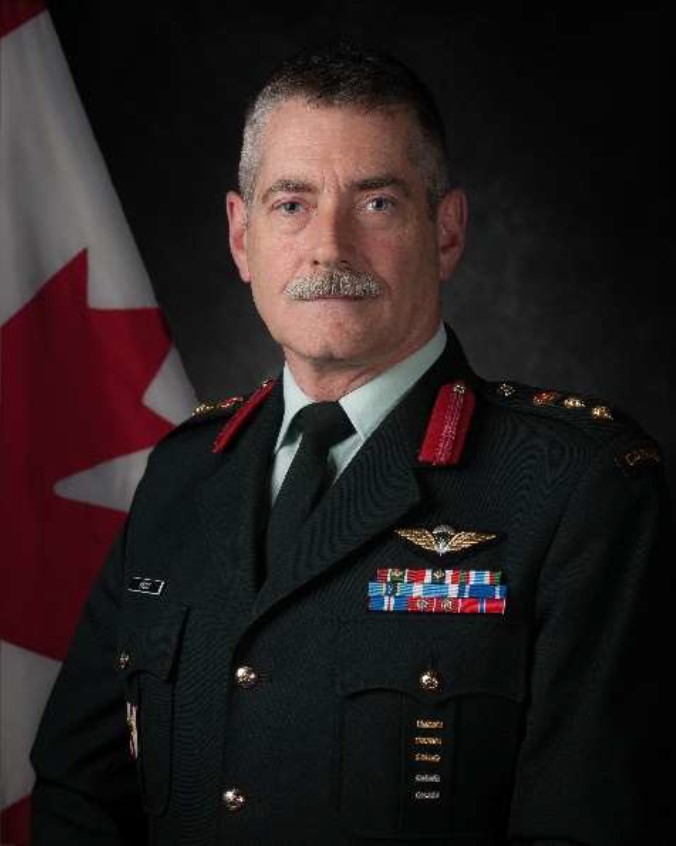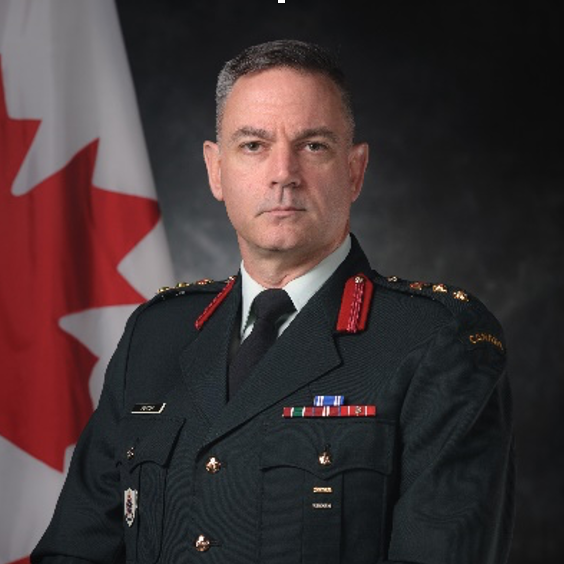One Korea – Two Nations
Date
Wednesday October 26, 202212:00 pm - 1:00 pm
Location
Online Webinar over ZoomOne Korea - Two Nations
Since the signing of the Armistice Agreement in 1953, the international community has pursued a range of talks, actions and initiatives aimed at achieving a final peace agreement for Korea. 70 years later a great deal has changed on the Korean peninsula, but the two nations are no closer to achieving an enduring peace. Is this due to the actions of the Democratic People’s Republic of Korea (North Korea), the Republic of Korea (South Korea), China or the USA? Examining the influences of the key players in the Korean Peninsula indicates that a solution is not likely in the near term, and why the Korean Peninsula could serve as a hinge point for a future conflict in the region.
Speaker

COLONEL ACTON KILBY, CD
Canadian Armed Forces
Colonel Acton Kilby joined the Canadian Armed Forces in 1979 as a Reservist and then entered the Regular Army in 1984 as an Infantry Officer. He is a member of the Royal Canadian Regiment and has served with 3rd Airborne Commando of the Canadian Airborne Regiment. He has commanded from Platoon to Battalion level and was acting Commander 2nd Canadian Mechanised Brigade Group while the Brigade deployed Canada’s last major rotation to Bosnia and Canada’s first ISAF Task Force to Kabul in 2005.
He served on exchange with the British Army 1999-2002 deploying in support of British Forces in several theatres of operation. In 2007-2008 he deployed to the Democratic Republic of Congo as the Deputy Chief of Staff for the UN Mission in the Congo and subsequently as special advisor to the African Great Lakes Task Force responsible for disarmament and demobilization of Armed Militias.
He served in the Canadian Army HQ as Director of the Land Staff and as Director Strategic Readiness with Canada’s Strategic Joint Staff. In 2010-2011, he deployed to Afghanistan as Director Stability with 10th (US) Mountain Division where he was responsible for Stability Operations in Regional Command South.
Col Kilby was the Canadian Defence Attaché to Australia, New Zealand, and Papua New Guinea (2013-16). He was subsequently appointed Director Foreign Liaison for the Canadian Armed Forces, responsible for supporting Canadas Defence Diplomacy program with 138 countries and exercising command of Canada’s Defence Attaches deployed around the world (2016-19).
In 2019, Col Kilby was selected as Director Senior Appointments responsible for the career management and support for all Senior Appointment Chief Warrant Officers, Colonels, General Officers and Flag Officers of the Canadian Armed Forces.
In August 2020, Col Kilby was assigned to United Nations Command HQ, South Korea as the Deputy Chief of Staff (DCOS) and has just returned to Canada to commence his transition to post-service life.
Col Kilby is a graduate of the Royal Military College of Canada, the Land Force Command and Staff College, the Canadian Forces Command and Staff College, and the National Strategic Studies Program.
He is an avid outdoor sportsman and loves fishing. He is married with three adult children.
Émile Lambert-Deslandes

Émile Lambert-Deslandes
RAS/NSA Project Coordinator
Political Studies
Robert Sutherland Hall #411
Émile is a doctoral student and Joseph-Armand Bombardier (CGS-D) Scholar in the Department of Political Studies at Queen’s University, studying International Relations and Security under the supervision of Dr. Stéfanie von Hlatky. He has been granted the Desjardins Scholarship, the G.G. Baron Van der Feltz Award for best master’s dissertation in International Relations, and the Ontario Graduate Scholarship (OGS; twice). Émile’s research is primarily focused on NATO deterrence, nuclear weapons, and nuclear latency. Additionally, he works on Canadian foreign and defence policy, as well as nuclear (non-)proliferation.
Émile has authored or co-authored articles, book chapters, and book reviews that have been published in International Affairs, the Journal of Strategic and Military Studies, the Palgrave Handbook on Contemporary Geopolitics, and The Conversation, and regularly analyzes international events on the radio. He is also a Graduate Research Fellow at the Centre for International and Defence Policy, and a Coordinator for the Network for Strategic Analysis. Previously, Émile earned a B.A. in International Development Studies at McGill University in 2020, and a M.A. in Political Studies at Queen’s University in 2022.
Online:
website: https://emilelambertdeslandes.ca/
Isabella Aung

Isabella Aung
PhD Candidate/Researcher
Political Studies
Mackintosh-Corry Hall, Room C303
Isabella Aung is a doctoral candidate researching women’s unprecedented political participation and leadership in the anti-military movement during the ongoing military coup in Myanmar. Decolonizing academia and incorporating the lived experiences of women of Color into academic discourse are her ultimate goals as a researcher. Her research interests include Women, Peace, and Security (WPS), women of Color's electoral representation, and grassroots women's activism against authoritarianism. She specializes in Gender and Politics and Comparative Politics. In terms of methodology, she is trained in both quantitative and qualitative methods. Her regional expertise is North America (particularly Canada) and South/Southeast Asia (particularly Myanmar). She is currently a UBC Myanmar Initiative Fellow. She also holds a doctoral scholarship, funded by the Research Network on Women, Peace, and Security at McGill University.
From the Margins and Outside the Box : New Perspectives on Researching the Military
Canada’s Capacity to Engage
The Need for Soft Skills in International Organizations: Experiences from NATO, UN and Coalition Headquarters
Date
Wednesday September 28, 20225:30 pm - 7:00 pm
Location
Queen's University
This Queen's undergraduate workshop is part of the CIDP's VDF Mentorship program series.
"To connect with the undergraduate body at Queen's and foster interest in international and defence policy, the CIDP is running a mentorship program with our Visiting Defence Fellows. Through workshops and small group discussions, students will facilitate a connection with experienced professionals in the field and develop critical skills. The program is designed to encourage interest in international and defence policy, as well as prepare undergraduate students with guidance regarding career development."
Our next event is "The Need for Soft Skills in International Organizations: Experiences from NATO, UN and Coalition Headquarters"
location: Robert Sutherland Hall Rm. 334 | 138 Union St.
Contact VDF mentorship program facilitator Sadie McIntosh for more information: 19sem17@queensu.ca
Owen Wong

Owen Wong
Graduate-Level Researcher
Political Studies
Robert Sutherland Hall, Rm 411
Owen Wong is a graduate-level researcher at the Centre for International and Defence Policy (CIDP) at Queen’s University. With funding from the Department of National Defence, Owen works with Dr. Stéfanie von Hlatky, the Canada Research Chair on Gender, Security, and the Armed Forces, to study how international organizations implement the Women, Peace, and Security (WPS) agenda. Specifically, his research focuses on the European Union’s WPS agenda, how gender-based disinformation can undermine international support for NATO’s missions and operations, and how the Department of National Defence should best respond to the gendered impact of hybrid warfare. Owen has a master’s degree in political studies and a bachelor’s degree in political studies and economics from Queen’s University. In addition to his work on WPS, Owen studies the macro-political regulation of ethnic conflict with Dr. John McGarry, the former Canada Research Chair in Nationalism and Democracy.
Islands and International Law, with Donald Rothwell FAAL
Date
Tuesday September 20, 20221:00 pm - 2:30 pm
Location
Online Webinar over ZoomIslands and International Law
A feature of the 1982 UN Convention on the Law of the Sea is the regime of islands. The convention was drafted to give clarity to the status of islands in the law of the sea, and their maritime entitlements, but the regime remains incomplete. China’s rejection of the 2016 South China Sea arbitral award and the response of many large coastal states to the tribunal’s interpretation of the juridical island/rock distinction shows how contested these issues are. Canada and Denmark may have settled their disagreement over Hans Island/Tartupaluk, yet islands are becoming ever more prominent in international law. Territorial disputes over islands are potential flashpoints between global powers. The maritime entitlements of islands are challenged. Island states are seeking reinterpretation of the law of the sea to address threats posed by sea-level rise.
Hybrid Event:
In Person Location: Law Building, Room 202 RSVP to lawevents@queensu.ca to register
Via Zoom: Register here: https://queenslaw.zoom.us/meeting/register/tJIsc-ihrDwtGdU-QVq_eRrA5ci5h8GUX0BZ

The Russia-Ukraine conflict a view from Canada’s Defence Attaché
Date
Wednesday September 14, 202212:00 pm - 1:00 pm
Location
Online Webinar over ZoomThe Russia-Ukraine Conflict - A view from Canada’s Defence Attaché
In his talk, Colonel Foster will speak to the following themes:
- Canada`s role in supporting Ukraine from a Defence perspective pre-24 Feb 2022;
- Defence Diplomacy – Defence Reform, Enabling Trade and tactical level training;
- The lead up to the invasion – sabre rattling and posturing;
- The invasion – a failed operation into Kyiv, uncovering atrocities; and
- Regroup and conflict in the Donbas and in the South of Ukraine.
Within each of these themes he will emphasize a few key points:
- Ukrainian Resiliency;
- Social Media Warfare; and
- Military Aid support.
Speaker

COLONEL ROBERT M. FOSTER, MSM CD
Canadian Defence Attaché - Ukraine
Colonel Robert Foster joined the Governor General’s Foot Guards in 1986 as a Guardsman. He chose a unique career path balancing part-time employment at unit, brigade and division level while employed on full-time service with the Army, Defence Research and Development Canada, and the Canadian Joint Operations Command.
Before commanding the Regiment from 2006 to 2009 he was Adjutant, Operations Officer and commanded all sub-units. He was also the primary author of the 125th anniversary edition of the Regimental History, Steady the Buttons Two By Two.
During his command he was appointed as the Commanding Officer of 33 Territorial Battalion Group (TBG) which he held from 2006-2011. In 2010, during OP CADENCE (G8/G20) summit), he commanded the Task Force Immediate Reaction Unit (IRU).
On the day prior to 9/11, Major Foster was appointed the Army Domestic Operations Officer where he planned over 7 major Domestic Operations in five years. He also managed the Army Civil-Military Cooperation (CIMIC) capability which included development of international programs and the deployments of CIMIC teams to Bosnia, Haiti, and Afghanistan.
LCol Foster joined Defence Research and Development Canada, as the Senior Military Officer for the Centre of Operational Research and Analysis. He was responsible for the operational deployments of over 40 Defence Scientists and military staff.
In 2011, LCol Foster deployed to Kabul, Afghanistan with the International Security Assistance Force as the Chief Training for Counter-Improvised Explosive Device (CIED).
On return he was appointed Reserve Advisor to Land Forces Central Area before taking up the position of Deputy Commander, 33 Canadian Brigade Group which he held until 2014.
In 2012, LCol Foster joined Canada Command as the J3 Special Events. LCol Foster developed, OP DISTINCTION, the seven year plan for military commemoration which included activities such as the ceremony for the First Nations and Métis at Rideau Hall to recognize Aboriginal support to the War of 1812, and the National Day of Honour which was held on 9 May 2014 to commemorate Canada’s Mission to Afghanistan; one of the largest military parades ever held on Parliament Hill and planned within four months.
Colonel Foster has been recognized for his service with the Meritorious Service Medal (2015) from the Governor General for his work on Commemorations, the Deputy Minister Commendation (2014) for the Afghanistan Memorial Vigil, Queen’s Diamond Jubilee Medal for voluntary service as Deputy Commander 33 CBG (2013), CDS Commendation (2011) for deploying Defence Scientists in Operations, DRDC DG CORA Commendation (2010) for leadership, and Commander Canadian Army Commendation (2004) for developing the Army CIMIC Capability.
Colonel Foster is a graduate of the Canadian Forces College, the Army Command and Staff College, and the Royal Military College of Canada.
Colonel Foster was promoted on 8 August 2014 to his current rank and assumed the the position of Director Army Reserve which he held for three years. He briefly retired from service to travel around the world with his wife and three children before returning to duty as the Canadian Defence Attaché to Ukraine.
